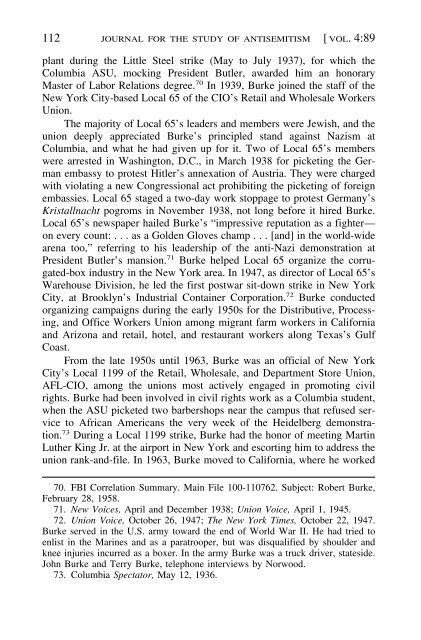Volume 4 No 1 - Journal for the Study of Antisemitism
Volume 4 No 1 - Journal for the Study of Antisemitism
Volume 4 No 1 - Journal for the Study of Antisemitism
Create successful ePaper yourself
Turn your PDF publications into a flip-book with our unique Google optimized e-Paper software.
112 JOURNAL FOR THE STUDY OF ANTISEMITISM [ VOL. 4:89<br />
plant during <strong>the</strong> Little Steel strike (May to July 1937), <strong>for</strong> which <strong>the</strong><br />
Columbia ASU, mocking President Butler, awarded him an honorary<br />
Master <strong>of</strong> Labor Relations degree. 70 In 1939, Burke joined <strong>the</strong> staff <strong>of</strong> <strong>the</strong><br />
New York City-based Local 65 <strong>of</strong> <strong>the</strong> CIO’s Retail and Wholesale Workers<br />
Union.<br />
The majority <strong>of</strong> Local 65’s leaders and members were Jewish, and <strong>the</strong><br />
union deeply appreciated Burke’s principled stand against Nazism at<br />
Columbia, and what he had given up <strong>for</strong> it. Two <strong>of</strong> Local 65’s members<br />
were arrested in Washington, D.C., in March 1938 <strong>for</strong> picketing <strong>the</strong> German<br />
embassy to protest Hitler’s annexation <strong>of</strong> Austria. They were charged<br />
with violating a new Congressional act prohibiting <strong>the</strong> picketing <strong>of</strong> <strong>for</strong>eign<br />
embassies. Local 65 staged a two-day work stoppage to protest Germany’s<br />
Kristallnacht pogroms in <strong>No</strong>vember 1938, not long be<strong>for</strong>e it hired Burke.<br />
Local 65’s newspaper hailed Burke’s “impressive reputation as a fighter—<br />
on every count: . . . as a Golden Gloves champ . . . [and] in <strong>the</strong> world-wide<br />
arena too,” referring to his leadership <strong>of</strong> <strong>the</strong> anti-Nazi demonstration at<br />
President Butler’s mansion. 71 Burke helped Local 65 organize <strong>the</strong> corrugated-box<br />
industry in <strong>the</strong> New York area. In 1947, as director <strong>of</strong> Local 65’s<br />
Warehouse Division, he led <strong>the</strong> first postwar sit-down strike in New York<br />
City, at Brooklyn’s Industrial Container Corporation. 72 Burke conducted<br />
organizing campaigns during <strong>the</strong> early 1950s <strong>for</strong> <strong>the</strong> Distributive, Processing,<br />
and Office Workers Union among migrant farm workers in Cali<strong>for</strong>nia<br />
and Arizona and retail, hotel, and restaurant workers along Texas’s Gulf<br />
Coast.<br />
From <strong>the</strong> late 1950s until 1963, Burke was an <strong>of</strong>ficial <strong>of</strong> New York<br />
City’s Local 1199 <strong>of</strong> <strong>the</strong> Retail, Wholesale, and Department Store Union,<br />
AFL-CIO, among <strong>the</strong> unions most actively engaged in promoting civil<br />
rights. Burke had been involved in civil rights work as a Columbia student,<br />
when <strong>the</strong> ASU picketed two barbershops near <strong>the</strong> campus that refused service<br />
to African Americans <strong>the</strong> very week <strong>of</strong> <strong>the</strong> Heidelberg demonstration.<br />
73 During a Local 1199 strike, Burke had <strong>the</strong> honor <strong>of</strong> meeting Martin<br />
Lu<strong>the</strong>r King Jr. at <strong>the</strong> airport in New York and escorting him to address <strong>the</strong><br />
union rank-and-file. In 1963, Burke moved to Cali<strong>for</strong>nia, where he worked<br />
70. FBI Correlation Summary. Main File 100-110762. Subject: Robert Burke,<br />
February 28, 1958.<br />
71. New Voices, April and December 1938; Union Voice, April 1, 1945.<br />
72. Union Voice, October 26, 1947; The New York Times, October 22, 1947.<br />
Burke served in <strong>the</strong> U.S. army toward <strong>the</strong> end <strong>of</strong> World War II. He had tried to<br />
enlist in <strong>the</strong> Marines and as a paratrooper, but was disqualified by shoulder and<br />
knee injuries incurred as a boxer. In <strong>the</strong> army Burke was a truck driver, stateside.<br />
John Burke and Terry Burke, telephone interviews by <strong>No</strong>rwood.<br />
73. Columbia Spectator, May 12, 1936.














